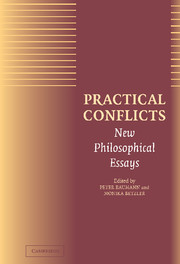Book contents
- Frontmatter
- Contents
- Foreword
- 1 Introduction: Varieties of Practical Conflict and the Scope of Practical Reason
- 2 Willing the Law
- 3 The Myth of Egoism
- 4 Thinking about Conflicts of Desire
- 5 Putting Together Morality and Well-Being
- 6 The Second Worst in Practical Conflict
- 7 Personal Practical Conflicts
- 8 Sources of Practical Conflicts and Reasons for Regret
- 9 Conflicting Values and Conflicting Virtues
- 10 Involvement and Detachment: A Paradox of Practical Reason
- 11 Outcomes of Internal Conflicts in the Sphere of Akrasia and Self-Control
- 12 Are There Insolvable Moral Conflicts?
- 13 Moral Dilemmas of Transitional Justice
- 14 Do Conflicts Make Us Free?
- List of Contributors
- Name Index
- Subject Index
- References
11 - Outcomes of Internal Conflicts in the Sphere of Akrasia and Self-Control
Published online by Cambridge University Press: 02 December 2009
- Frontmatter
- Contents
- Foreword
- 1 Introduction: Varieties of Practical Conflict and the Scope of Practical Reason
- 2 Willing the Law
- 3 The Myth of Egoism
- 4 Thinking about Conflicts of Desire
- 5 Putting Together Morality and Well-Being
- 6 The Second Worst in Practical Conflict
- 7 Personal Practical Conflicts
- 8 Sources of Practical Conflicts and Reasons for Regret
- 9 Conflicting Values and Conflicting Virtues
- 10 Involvement and Detachment: A Paradox of Practical Reason
- 11 Outcomes of Internal Conflicts in the Sphere of Akrasia and Self-Control
- 12 Are There Insolvable Moral Conflicts?
- 13 Moral Dilemmas of Transitional Justice
- 14 Do Conflicts Make Us Free?
- List of Contributors
- Name Index
- Subject Index
- References
Summary
Practical conflicts include conflicts in agents who judge, from the perspective of their own values, desires, beliefs, and the like, that one prospective course of action is superior to another but are tempted by what they judge to be the inferior course of action. A man who wants a late-night snack, even though he judges it best, from the identified perspective, to abide by his recent New Year's resolution against eating such snacks until he has lost ten pounds, is the locus of a practical conflict. So is a woman who judges it best (in the same way) to run a mile this morning but is tempted to spend the entire morning working in her office instead. The topic of this essay is practical outcomes of conflicts of this kind. My concern, more specifically, is with outcomes of two general kinds: akratic (from the classical Greek term akrasia: want of self-control) and enkratic (from enkrateia: self-control) actions.
Strict akratic action may be defined as free, sane, intentional action that the agent consciously believes at the time of action to be inferior to another course of action that is open to her then, inferior from the perspective of her own values, desires, beliefs, and the like. The belief against which an agent acts in strict akratic action may be termed a decisive belief.
- Type
- Chapter
- Information
- Practical ConflictsNew Philosophical Essays, pp. 262 - 278Publisher: Cambridge University PressPrint publication year: 2004

